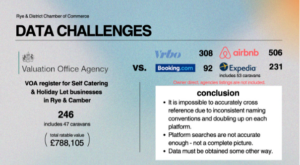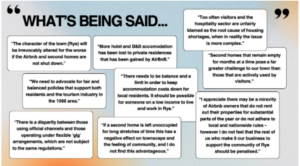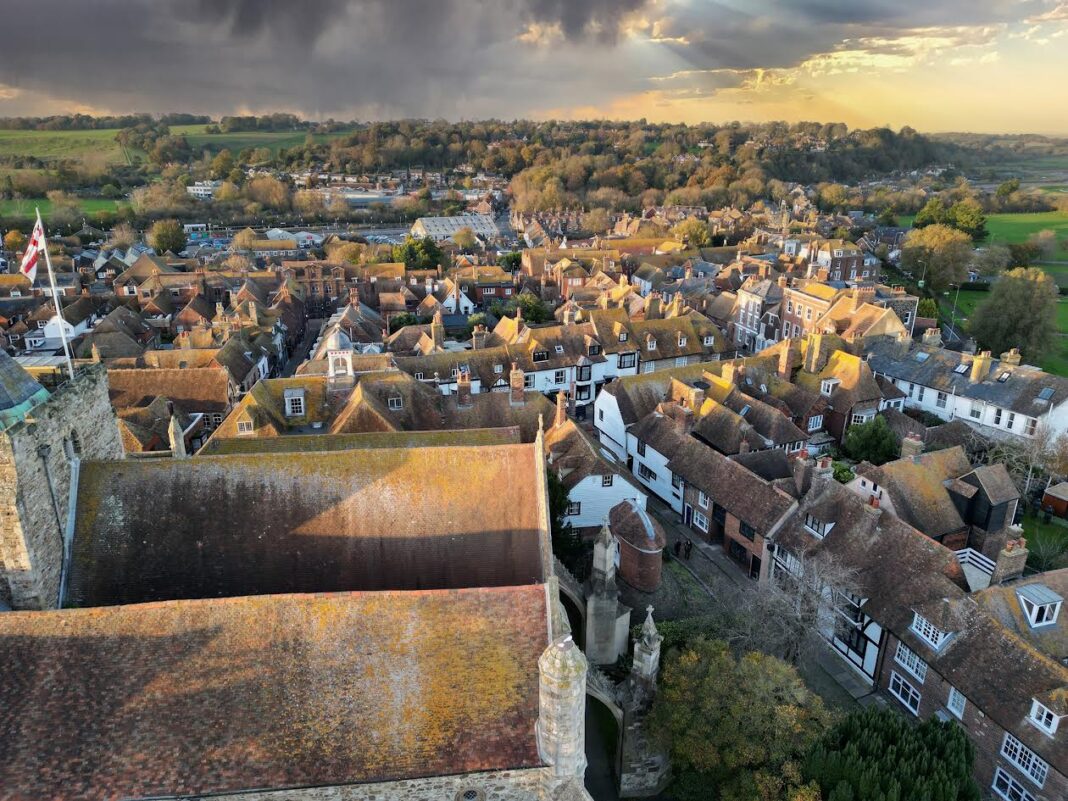The number of Airbnbs and second homes in Rye is on the agenda again. As we report in the news section of this week’s paper, Rother District Council has launched an online consultation to get the thoughts of people living in Rye, Winchelsea and Camber to help understand the scale of the issue and come up with a solution.
RDC has also set up a working group to discuss what to do and last week they heard from Rye and District Chamber of Commerce who gave an hour-long presentation following weeks of data research and consultation with their members, online travel agents, local booking agents, the town’s estate agents and the VOA. The Chamber also consulted councils in other tourism hot spots around the UK who face similar challenges.
Vice-chair Sarah Broadbent explains how the Chamber sees this complex problem and says it needs a balanced approach in a town that relies almost exclusively on the visitor economy, but also has an affordable housing shortage.
Data Challenges
The available data isn’t clear cut and unless further work is done to drill down on the
numbers then it’s unfeasible to consider what moves could be made by the local authority that might affect positive change without risking the economy of the town. In short – the Chamber argued – be careful what you wish for.

The current list of holiday rentals that are registered for business rates in Rye and Camber totals 246. Notwithstanding the fact that many of these properties will currently benefit from either Small Business Rates Relief or Tourism and Leisure Rates Relief – the total business rateable value of these properties is £788,105.
The Chamber identified that data from the on-line travel agents (OTAs) themselves is
unreliable. Each OTA offers different search criteria so a like-for-like comparison is
impossible. Determining a total number of holiday lets in the area is almost impossible
without further investigation. It should be noted that all short lets that are available for rent 140 nights out of 365 and are actually rented at least 70 out of 365 should be registered for business rates. But from the unverified data it seems that there are a huge number of short term lets in the area over and above those identified by the Valuation Office Agency (VOA) which potentially means that they are falling outside of ‘the system’.
The Chamber urged the Task and Finish group to proceed with caution unless further work on this can be undertaken.
Two Issues
While there is often an overlap between second homes and Airbnbs, each also presents a distinct set of issues: a second home may also be a short-term rental, but isn’t necessarily so, and a short-term rental isn’t always a second home.
Compliance
The Chamber identified a pyramid of compliance when categorizing short-term lets. It reveals that many properties are run as businesses, registered for business rates and are fully compliant without necessarily being used for second homes at all. Others may also be fully compliant with rules and regulations but used by owners as a second home when not filled with paying guests. The ‘grey area’ is solo holiday let owners who may have up to five properties on Airbnb at very low commission rates and may not be compliant with safety regulations, public liability, or waste management regulations. All of this is anecdotal in the face of a lack of hard data.

The previous Government began work on introducing a statutory register for short lets, but this has yet to materialise, and one wonders if and when it does whether Rother will have the resource to introduce it or indeed will be in existence by the time it is a requirement. From the responses received by the Chamber it appears that most people don’t have a problem with legitimate holiday lets if they are fully compliant, paying their dues and are bringing people to the town. But what people do take issue with is second homes that are seldom let, and often empty – these are seen as detrimental. However, those two issues are very often conflated – and this is why next steps need to be carefully considered.
Loopholes
While second homes will be penalised with double council tax from April 1 and stamp duty at 5% over and above the standard rate, it remains to be seen whether this will help level the playing field as the Chamber has identified there are too many loopholes. Homeowners may simply put their property up for sale but ‘soft market’ it for a year – to defer payment of the new rate of council tax, for example. Planning changes are afoot to ensure that future new builds are not able to be used as second homes – but this is yet to be introduced. Meanwhile it may suit the council to have holiday lets unregistered for business rates as they are potentially paying more in council tax than they might be under business rates relief.
Tourism Tax
While the Task and Finish group was keen to hear ideas on tourism taxes, the Chamber explained that the only means of introducing this currently is via the BID mechanism which they are already exploring for Rye using the levelling up funding they were awarded last year. The Chamber urged the Task and Finish group to listen to more stakeholders in the town as it progresses with its work.
Image Credits: KT Bruce , Rye Chamber of Commerce .




It’s even more complicated when you consider that some properties are let via holiday let agents rather than as AirBnBs, and that it’s not unknown for local people to AirBnB their spare rooms to make a little extra cash. Caravans and sheds also turn up regularly online as off-grid or glamping possibilities. It’s all part of the joy of living in a popular tourist area — we even passed a tent on Gibbet Marsh last Sunday with, from the sound of it, at least three men inside talking about fishing! I hope this doesn’t signal the start of a new trend…although having read Mapp & Lucia, I think all of the above was going on a hundred years ago. The difference is the internet’s power to scale up everything we do!
But I agree that finding out how many homes that could be let to locals are being reserved as second homes or investments or holiday lets is a valuable first step. No discussions can take place between the various stakeholders until a clear picture emerges. I applaud the Chamber’s efforts to play a leading role in a situation that appears to be getting out of control.